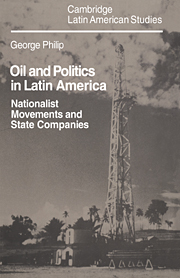Book contents
- Frontmatter
- Contents
- List of tables
- Preface
- Glossary
- Abbreviations
- Note on currencies and other units of measurement
- Maps: Latin America in 1920, 1940, 1960 and 1981; showing importing countries, exporting countries and countries self-sufficient in oil
- Introduction: The politics of oil in twentieth-century Latin America
- Part I The world oil environment
- Part II The major expropriations
- 7 Politics and the concession contract
- 8 Argentina: YPF, Yrigoyen and the 1935 oil law
- 9 Some nationalisations of the 1930s: Chile, Uruguay, Bolivia
- 10 Cárdenas and the Mexican oil nationalisation
- 11 The formation of Petrobrás
- 12 The nationalisation of the ipc in Peru
- 13 The nationalisation of Gulf Oil in Bolivia 1969
- 14 Oil politics in Ecuador 1972–6
- 15 The nationalisation of oil in Venezuela
- 16 Oil companies and governments in twentieth-century Latin America
- Part III The state oil companies
- Notes and bibliography
- Index
- CAMBRIDGE LATIN AMERICAN STUDIES
8 - Argentina: YPF, Yrigoyen and the 1935 oil law
Published online by Cambridge University Press: 23 December 2009
- Frontmatter
- Contents
- List of tables
- Preface
- Glossary
- Abbreviations
- Note on currencies and other units of measurement
- Maps: Latin America in 1920, 1940, 1960 and 1981; showing importing countries, exporting countries and countries self-sufficient in oil
- Introduction: The politics of oil in twentieth-century Latin America
- Part I The world oil environment
- Part II The major expropriations
- 7 Politics and the concession contract
- 8 Argentina: YPF, Yrigoyen and the 1935 oil law
- 9 Some nationalisations of the 1930s: Chile, Uruguay, Bolivia
- 10 Cárdenas and the Mexican oil nationalisation
- 11 The formation of Petrobrás
- 12 The nationalisation of the ipc in Peru
- 13 The nationalisation of Gulf Oil in Bolivia 1969
- 14 Oil politics in Ecuador 1972–6
- 15 The nationalisation of oil in Venezuela
- 16 Oil companies and governments in twentieth-century Latin America
- Part III The state oil companies
- Notes and bibliography
- Index
- CAMBRIDGE LATIN AMERICAN STUDIES
Summary
Argentina was the first Latin American country to set up an effective state oil company and one of the first to take strong legislative measures limiting the activities of the private companies. The underlying motive for these measures lay as much in Buenos Aires's distrust of the provinces as in the behaviour, or even the presence, of the oil companies themselves. Moreover, to a considerable extent the story of Argentine oil nationalism is that of the growth and development of the state oil company, Yacimientos Petrolíferos Fiscales (YPF). If these were the underlying factors, however, it is also true that Argentina saw the first major oil nationalist campaign, led by Yrigoyen in 1928, which raises questions about the nature of the political support that a movement of this kind could attract. All the same, it is best to begin with a discussion of the way in which the industry itself developed.
The Argentine oil commission 1907–22
In December 1907 a team belonging to the Argentine Ministry of Agriculture was apparently drilling for water at Comodoro Rivadavia when it struck oil in a shallow depth of what proved to be a huge field from which one billion barrels were ultimately recovered. Some observers have expressed doubts as to whether this find really was accidental and there was certainly an air of mystery surrounding its immediate circumstances.
- Type
- Chapter
- Information
- Oil and Politics in Latin AmericaNationalist Movements and State Companies, pp. 162 - 181Publisher: Cambridge University PressPrint publication year: 1982



